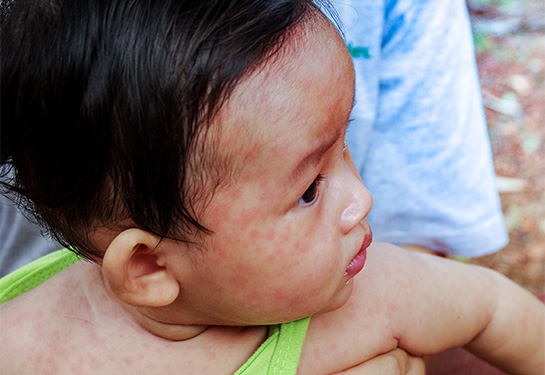-
December 24, 2025
Norovirus is surging again. Tips for how to dodge the 'stomach flu'
Hand sanitizer doesn’t work well on this common, contagious illness. Washing your hands is best.
Read More -
December 10, 2025
Why the hepatitis B vaccine is critical for newborns
A pediatric infectious diseases expert explains why it is important for children to be vaccinated for hepatitis B and debunks common myths about the disease.
Read More
Hepatitis B Symptoms, Transmission and Vaccine Explained
-
November 25, 2025
Now is the time to get your flu shot to help prevent serious illness
As projections point toward a severe flu season, a UC Davis infectious disease expert answers questions about why getting a flu shot matters.
Read More
-
October 02, 2025
Teen mysteriously loses mobility after common cold
An active teenager lost mobility after a common cold. Then a team from UC Davis Children’s Hospital provided the treatment that completely restored her movement.
Read More
-
September 12, 2025
New global collaboration uses UC Davis experts and AI to spot the next pandemic
An infectious diseases team from UC Davis is taking a leading role in an international collaboration to identify viruses that may cause the next global pandemic.
Read More
-
August 20, 2025
UC Davis Medical Center to become first Special Pathogen Treatment Center in Northern California
UC Davis Medical Center is on track to become the first Special Pathogen Treatment Center in Northern California, to handle patients with contagious infectious diseases.
Read More
-
July 01, 2025
Lenacapavir approved by FDA: What it means for HIV prevention
HIV expert Sarah Waldman discusses recently approved prevention treatment lenacapavir and why it could be a game changer in the fight against the HIV epidemic.
Read More
-
June 23, 2025
Experiencing awe may help people with long COVID feel better mentally
In a new study, researchers examined how the feeling of awe might help people struggling with long COVID.
Read More -
June 06, 2025
Infectious diseases experts raise alarm about antifungal resistance, call for global effort
Infectious diseases experts are raising the alarm about the role new pesticides can play in building resistance to antifungal medical treatments.
Read More
-
May 19, 2025
Whooping cough cases continue to rise in the U.S.: How to protect yourself and your family
Cases of pertussis, widely known as “whooping cough,” have been on the rise globally, with 590 people reporting the illness in California in 2025.
Read More -
May 07, 2025
Addressing diarrhea in pediatric kidney transplant patients
UC Davis Health team detail how diarrhea can impact pediatric transplant patients and offer potential clinical responses.
Read More
Whooping Cough (Pertussis) Diagnosis, Symptoms and Treatment
-
March 01, 2025
Improving indoor air quality for better public health
UC Davis researchers are studying ways to optimize the flow of outdoor air into buildings for both energy efficiency and reducing exposure to pollutants.
Read More
-
February 28, 2025
Measles outbreaks: symptoms, treatment and prevention: What parents need to know
With measles outbreaks occurring now throughout the U.S., UC Davis Health experts advise parents to be aware of the symptoms.
Read More
Measles: What Parents Need to Know
-
October 25, 2024
Got fever, sore throat and cough? It may be ‘walking pneumonia’
We asked infectious diseases expert Dean Blumberg to answer some questions about walking pneumonia and what families can do to keep children healthy.
Read More -
October 18, 2024
Video series aims at improving indoor air quality
Experts at the UC Davis College of Engineering and California Department of Public Health developed a new video series about improving indoor air quality.
Read More
-
September 04, 2024
What you need to know about the latest mpox outbreak
Mpox clade I, a more severe type of the virus formerly called monkeypox, is spreading quickly in Africa. An infectious diseases expert answers questions about the outbreak.
Read More
-
August 23, 2024
What you need to know about the 2024-25 COVID-19 vaccine recommendations
What do you need to know about the new COVID vaccine? Infectious diseases experts Stuart Cohen and Dean Blumberg answer questions on the 2024-2025 COVID vaccines and who should get them.
Read More -
August 07, 2024
Back to school 2024 amid a COVID surge: Latest symptoms and guidelines
As children go back to school this month with new classrooms and teachers, an infectious diseases expert shares the latest COVID symptoms, treatments guidelines.
Read More
New 2024-25 COVID Vaccine and Variants Explained
-
April 25, 2024
1 in 5 milk samples from grocery stores test positive for bird flu. Why the FDA says it’s still safe to drink
The FDA announced Thursday that one in five milk samples taken from grocery stores tested positive for bird flu. UC Davis experts explain the limits of the test and how to protect yourself from avian influenza.
Read More -
April 15, 2024
HPV vaccine protects against cancers, genital warts
April is STD awareness month. We talked with our chief of pediatric infectious diseases about the HPV vaccine and how it prevents cancer.
Read More





















